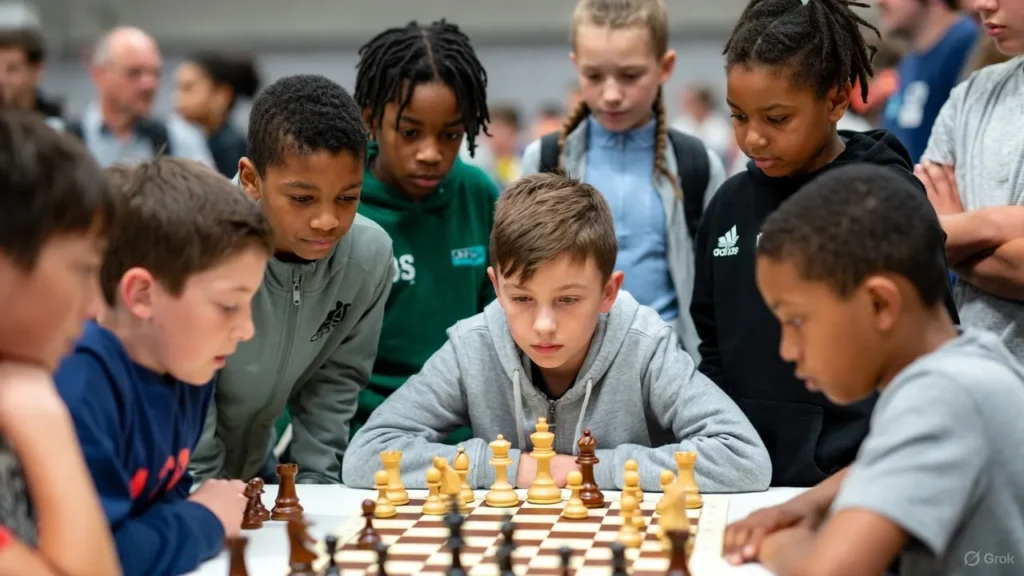Finding the right chess club makes learning more fun, speeds your improvement, and connects you with people who love the game. Below is a simple, practical guide — whether you’re a brand-new beginner or an advanced player looking for strong competition.
1. Start with your goal
Before you look at clubs, ask yourself:
- Do you want to learn the rules and basic tactics? (Beginner)
- Do you want regular practice and friendly tournaments? (Intermediate)
- Do you want serious training, high-level sparring, and rated events? (Advanced)
Knowing your goal narrows the clubs that match your needs.
2. What beginners should look for
Beginners need patience, structure, and chances to play without pressure.
- Coaching or classes: Group lessons or beginner workshops.
- Friendly atmosphere: Encouraging members who explain moves kindly.
- Practice opportunities: Casual play, puzzles, and coached games.
- Resources: Club-owned boards, books, or online study groups.
- Flexible schedule: Weekend or evening sessions that fit your life.
3. What intermediate players should look for
Intermediates need steady practice, feedback, and a mix of casual and competitive play.
- Regular tournaments: Rated and unrated events to test progress.
- Analysis sessions: Post-game reviews or study groups.
- Mixed skill play: Chances to beat weaker players and learn from stronger ones.
- Teacher or mentor: A coach or senior player who can give tips.
- Online presence: Club Discord, Lichess, or Chess.com teams to play between meetups.
4. What advanced players should look for
Advanced players want serious opponents and structured improvement.
- High average rating: Other strong players to practice with.
- Strong tournaments: Frequent rated events and rapid/blitz options.
- Expert coaching: Coaches who work on openings, endgames, and preparation.
- Sparring partners: Regular training matches, simul opportunities.
- Professional structure: Clear calendar, membership rules, resources for deep study.
5. Practical club features to check
Use this quick checklist when evaluating clubs:
- Location and meeting times (convenience)
- Cost (dues, tournament fees)
- Member skill range (who attends)
- Coaching availability and cost
- Frequency of events and tournaments
- Child-friendly or adult-only sessions (if relevant)
- Online/remote play options
- Club culture (competitive vs. social)
- COVID / health policies if in person
6. How to try a club before joining
- Attend one or two open nights as a guest.
- Ask for a trial lesson or casual play session.
- Watch a tournament or analysis session first.
- Talk to members about their experiences.
Most clubs welcome visitors — use that chance to feel the vibe.
7. Online vs in-person clubs
- In-person: Best for making friends, live coaching, and over-the-board tournaments.
- Online: Great for convenience, quick practice, and finding players of any strength.
- Hybrid clubs: Offer both — often the most flexible option.
8. Club etiquette and what to bring
- Be on time and respectful.
- Bring a chess set and a scoresheet if required.
- Bring a pen and a bottle of water.
- If it’s a tournament, know the time control and rules.
- Shake hands before and after the game (if that’s the local custom).
9. Questions to ask a club (short list)
- Do you offer beginner classes or one-on-one coaching?
- How often do you hold tournaments?
- What are the membership costs?
- What is the typical skill level of members?
- Can I visit before joining or try a session for free?
Quick summary checklist
- Know your goal (learn, practice, or compete).
- Visit the club and feel the atmosphere.
- Confirm coaching, events, schedule, and cost.
- Try before committing.
- Choose online, in-person, or hybrid based on convenience and goals.

I’m a passionate board game enthusiast and a skilled player in chess, xiangqi and Go. Words for Attacking Chess since 2023. Ping me at Lichess for a game or chat.

